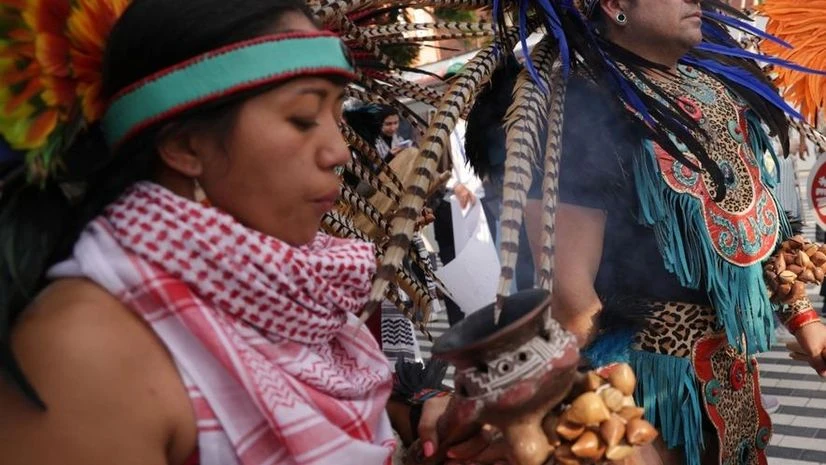By Laura Millan
Indigenous people from every continent dressed in traditional clothes, young climate advocates and seasoned activists marched in the biggest demonstration yet at the COP28 climate talks on Saturday, an unusual sight in the United Arab Emirates where any form of protest is severely restricted.
Hundreds gathered inside the COP’s Blue Zone — officially United Nations territory for the two week of negotiations — alternating between the war in Gaza and climate change, shouting “ceasefire now” and “climate justice now” as they approached the building where country negotiators are debating global climate policy.
“I’m not anticipating we’ll get the outcome we want given we are in a state that supports fossil fuels,” said Lorraine Chiponda, a Zimbabwean climate activist with the Don’t Gas Africa campaign. “This COP started going in the right direction with the loss and damage fund, but we need more.”
The approval by the 198 countries participating in the talks of the rules for a fund to help poor countries recover from climate disasters on the first day of COP28 was an early victory for negotiators at the summit. But over the past few days old tensions have reemerged, with over 100 countries calling for the final text to include a reference to the phase out of all fossil fuels — and others opposing it.
Also Read
Chilean climate and gender activist Karin Watson was hopeful global leaders would agree on language to phase out fossil fuels. But campaigners have been disappointed before as COP decisions are reached by consensus and that often leads to final outcomes including just the minimum common denominator, she said.
“It would be terrible that the decision was delayed by another year because we can’t wait,” said the 26-year-old. “Last year we had a bit of hope and it didn’t happen and this year we are a bit more hopeful — it’ll be hard, but we think it can happen.”
Activists waved large banners, carried a large plastic pipeline, chanted and danced hoping to put some pressure on country delegates negotiating on climate — but on other issues too. Protesters held a sit-down to mark the more than 17,000 people killed in Gaza since the conflict started on Oct. 7, including about 5,500 children, according to Gaza Health Ministry figures. They staged a moment of silence as they held a banner featuring names of people killed. Across the march, banners calling for climate justice featured the colors red, black and green present in the Palestinian flag.
Protests at COP28 have been more restricted than in previous climate meetings, said Katharina Rall, a researcher with Human Rights Watch. Free speech, demonstrations and other freedoms are severely restricted in the United Arab Emirates, the country presiding and hosting COP28. But protest has proven difficult even in the Blue Zone because the UN Framework Convention on Climate Change, the agency overseeing the meeting imposes restrictions.
“We’re spending many hours negotiating with the UNFCCC secretariat, and that’s keeping us from doing actual work,” Rall said. “Just this week just 30 minutes before a protest was supposed to start we were forced to cover the names in banners of some human rights defenders behind bars even if the action had been previously been approved.”
The UNFCCC is committed to ensure everyone’s perspectives are heard, a spokesperson said in an emailed comment. The agency said it has been working to ensure its code of conduct is followed in a small number of specific cases.
Protesters used the Saturday march to lay out their claims including the need for finance to fund loss and damage and developing nations’ adaptation to a warming planet. Pacific islanders carried a giant banner that read “We are drowning,” while a Ugandan group called for the cancellation of the country’s debt.
Nicole Hutton, a Gorawa indigenous woman from Australia’s Northern Territory held a black box carrying a petition signed by 46,000 people to “kick fossil fuel lobbyists out of COP.” Oil and gas industry representatives at the conference outnumber indigenous national delegates, she said.
“There is no climate justice without human rights and first nations,” she said. “We’re here because we can’t let these conversations happen without us.”

)
